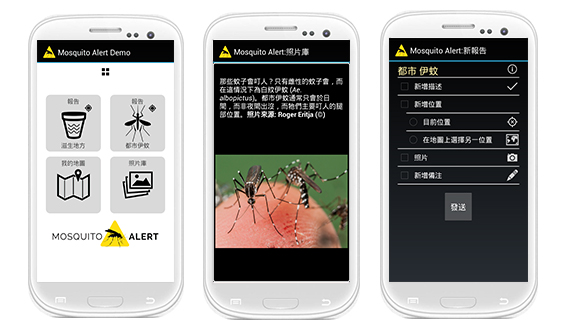A multidisciplinary team of citizen scientists, civic hackers, medical students, and “big data” experts from Hong Kong have started working to adapt the Mosquito Alert citizen science project to their region. The initiative began after the group participated in an international Hackathon addressing the worldwide status of the Zika virus where they learned about the Mosquito Alert project.

The Hong Kong team.
Beginning a few months ago, a team of open science enthusiasts and experts on data management and mobile device application development have started working on the Chinese version of the Mosquito Alert app. Their objective is to fight against mosquitos transmitting diseases in Asian countries. “We want to adapt the app to our area in order to deal with the mosquito problem that we have in Hong Kong,” says Scott Edmunds, from Open Data Hong Kong and executive editor of GigaScience in Hong Kong. In this region, mosquitos and particularly the tiger mosquito are spreading, and abundant for much of the year. “Our objective,” says Abbie Jung, co-founder of Synergy Social Ventures, “is to be able to mark on a map the places where the mosquitos breed, and not only the tiger mosquitos of which there are many, but also the yellow fever mosquito which is found in Taiwan and on the island of Hainan.”
The Chinese version of the Mosquito Alert app will allow citizens to send photos of adult mosquitos and their breeding sites, all of which will be geo-located on a map. And, just like the Spanish version, photos sent with the app will be validated by a team of entomologists. So, while much of the app will stay the same, “it is possible that in the long term we will make some changes to the app, but that will have to be seen in time,” says Mendel Wong, information technology expert. For the time being the application has already been translated to traditional Chinese for Hong Kong and Taiwan, and work is underway to translate it to simplified Chinese making it more accessible to the billion Mandarin speakers in mainland China. The translation work has been carried out by Sabrina Wong, a medical student studying in the University of Hong Kong interested in human rights and public health issues.

‘Demo’ version of the Mosquito Alert app in Chinese.
Yellow fever alert
On top of grave worries about Zika, public health officials in China are also very concerned about yellow fever, and in April alone there were 11 reported cases of yellow fever imported from Angola. There hasn’t yet been any case of local transmission, but the record spring rains this year could favour vector breeding, thereby increasing the risk of an epidemic. According to the Hong Kong team, “we need to concentrate our attention here since we already have problems with stagnant water in urban areas, such is the case with the Pearl River.”
The road to open data
As an additional benefit of this collaboration, the Hong Kong team hopes to contribute in many more ways to the project, such as helping transition Mosquito Alert towards open data. According to Scott Edmunds, “it would be a big step forward to standardize the documentation of data generated by this platform.” The philosophy of open data is becoming more and more common among projects working with data, and consists in making them more accessible and available to everyone.




